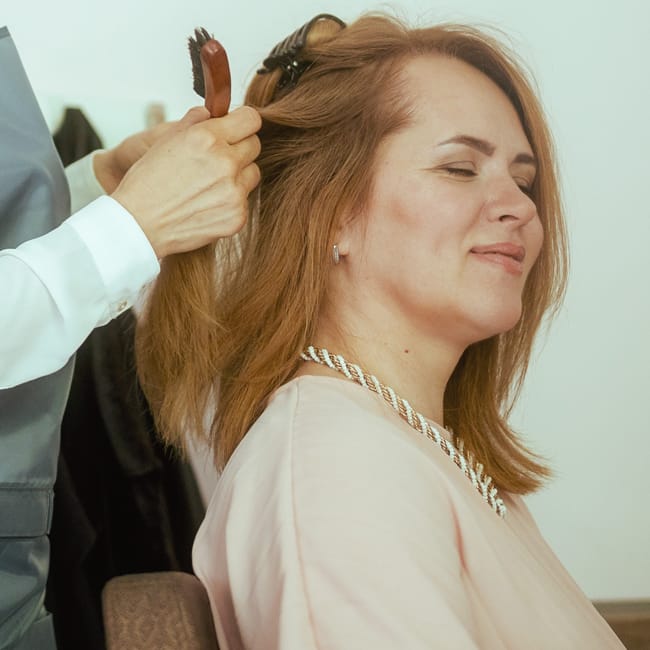Navigating the complexities of thinning hair and excessive shedding can be overwhelming, but understanding the importance of hair oils and scalp serums is crucial. These potent tools can invigorate hair follicles, nourish the roots, and ultimately lead to stronger, more vibrant hair.
With a multitude of hair oils available, we consulted experts in dermatology, medicine, and haircare to uncover four common mistakes that might be causing unintentional harm to your hair and scalp, especially if you’re experiencing hair loss or not addressing the issue effectively. They also provided straightforward solutions to encourage thicker, shinier, and healthier hair this summer.
Read on for suggestions and insight from Dr. Yoram Harth, MD, board-certified dermatologist and Medical Director of MDhair, Jake Woods, dermatologist and co-founder of GyaLabs, Ghanima Abdullah, hair expert and cosmetologist at The Right Hairstyles and Dr. Dejarra K. Sims, naturopathic doctor and natural skincare expert.


Dermatologists Share 4 Hair Oiling Mistakes That Can Lead To Damage And Breakage—And Simple Fixes
1. Using The Wrong Hair Oil For Your Type And Texture
Harth explains that "there are two main types of hair oils," and it is imperative to choose one that best suits your type, texture and needs. "One, which is applied to the scalp skin and intended to help with scalp health and hair regrowth, is called a scalp treatment serum," he notes. Harth adds that the other type of hair oil is "applied to the hair strands and is intended to help strengthen the strands and reduce breakage and split ends."
Scalp oils, particularly those "designed as scalp treatment serums," can be beneficial for thin, fine hair, Harth stresses. These oils are "formulated to promote scalp health, nourish the hair follicles, and stimulate blood circulation in the scalp." A healthy scalp environment can lead to "improved hair growth and a reduction in hair loss," he goes on. The best scalp oils or scalp treatment serums "would include DHT blockers that help reduce the effects of DHT on the hair follicles," he points out.
For beginners, Harth recommends "using a combination of plant-based scalp treatment serums like MDhair regrowth serum and another type of oil to apply often to the hair strands, like MDhair's peptide hair repair oil."

2. Not Diluting Your Hair Oil With A Carrier Oil
Some essential oils, such as rosemary oil, lavender oil, peppermint oil, and cedarwood oil "have been suggested to promote hair growth and improve scalp health," Woods acknowledges. He notes that "you can dilute a few drops of essential oil with a carrier oil, such as coconut or jojoba oil," and gently massage it into your scalp.
Carrier oils, as Sims also elucidates, are foundational oils used to temper essential oils, ensuring they are safe for direct skin application, since essential oils in their pure form are far too intense to be applied without dilution. "I would be careful about the sources of all things you put on your scalp," she advises.
For example, if you want to try applying rosemary oil to your scalp and hair, she says to "read the ingredients list to make sure there is actually rosemary in the product and not just a fragrance that smells like rosemary." Also, she says to "never use rosemary essential oil directly on the scalp, as it must be in a carrier oil."

3 Applying Too Much Hair Oil
As rosemary oil can "help increase blood flow to the scalp and nourish the hair follicles with nutrients," Sims recommends applying "6-10 drops of rosemary oil into the affected areas of the scalp." She emphasizes the importance of refraining from adding extra product, as doing so could result in greasier, heavier hair, ultimately causing damage.
"Add enough to cover the area but not saturate it," she instructs. "Then gently massage it in. Also, add oil to both your shampoo and conditioner," she continues.

4. Not Being Consistent With Your Hair Oiling Routine
To encourage swift regrowth and preserve the health of your locks, Abdullah emphasizes the importance of maintaining a consistent haircare regimen. This should include shampoos and conditioners recommended by a healthcare professional, along with nourishing hair oils. Neglecting a consistent routine can result in damaged, oily, and heavy hair, potentially exacerbating any existing hair loss. With rosemary oil for example, she recommends "adding a few drops to a 4 ounce bottle of lotion."
Lotion, she says "absorbs quicker into the skin." She notes to "use this solution twice" daily. "Don't expect to see results overnight. It will take at least six months," she adds. "If you're not sure what type of hair loss you have, use more than one essential oil in your lotion," Abdullah instructs. "You can add a few drops of rosemary to counter DHT and peppermint to stimulate the hair follicles, but still, it will take time before you see results," she adds.

The Bottom Line
Woods concludes that it is "crucial to consult with a healthcare professional or a dermatologist if you're experiencing significant hair loss or thinning."
They can "evaluate your specific condition, provide an accurate diagnosis, and recommend appropriate treatments or interventions tailored to your needs," he stresses. However, in the meantime, you can use these pointers as a hair or scalp oiling beginner and know which common mistakes to avoid!

























